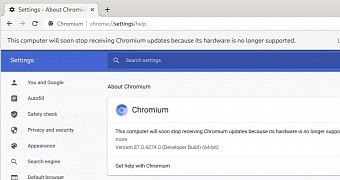Google is getting ready to make some pretty big changes for Chrome browsers, with version 89 to require a chip with SSE3 on desktop platforms.
The change will only happen on x86 systems, and Google says it’s likely that only a small number of users would actually be impacted because the number of computers still using SSE2 is pretty small right now.
“Chrome will no longer be usable on computers with x86 processors that support SSE2 but do not support SSE3. This is expected to reduce Chrome usage on Windows by a very small amount. Our analysis indicates that there is a very small number of Windows devices running Chrome with x86 processors that do not support SSE3,” Google explains.
Google Chrome 87 will begin to display a notification if SSE3 is not detected in an attempt to prepare the userbase for the change happening in version 89.
Small impact
Google expects the impact on Windows and Linux to be insignificant, while on Mac there won’t be any impact at all given the company only offers 64-bit builds “which allows us to assume SSSE3 support.”
“Until we require SSE3, Chrome will warn impacted users (with x86 CPUs that don’t support SSE3) that their computers will soon be unsupported. The implementation will use the framework in //chrome/browser/obsolete_system. This will result in a dismissable warning bar, and a permanent warning in the chrome://settings/help page,” Google explains.
Needless to say, the change is unlikely to be noticed by the majority of Google Chrome users, but on the other hand, some would no longer be able to install the latest build of the browser.
Given SSE2 was launched in the early 2000s, not a lot of up-to-date computers are still running the latest versions of Chrome, and this is why the company expects the impact to be as small as it gets.

 14 DAY TRIAL //
14 DAY TRIAL //